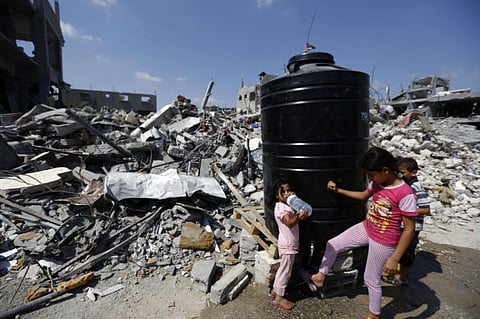Abbas role in Gaza to be largely ‘symbolic’
Hamas emerges as winner as Israel did not achieve any of its stated goals

Dubai: Despite the heavy civilian loss of over 2,100 Palestinians, mostly civilans, the scenes of jubilation were waranted according to analysts speaking to Gulf News. “Israel could not break the will of the Palestinian people,” Abdul Bari Atwan, former editor of the pan-Arab newspaper Al Quds Al Arabi told Gulf News.
"Hamas is justified to claim victory for the simple fact that it survived and was able to keep its weapons and tunnels.” According to Ramzy Baroud, the editor of PalestineChronicle.com, Israel lost the war because they set out with specific objectives such as destroying tunnels, killing Hamas leaders and stopping rocketfire into Israel. “None of these were achieved and now the resistance is stronger than ever,” he said. This should serve as a lesson to Israel, according to Baroud, that ‘political objectives cannot be achieved through military power.’
According to the deal, the Palestinian National Authority headed by Mahmoud Abbas, is expected to take on a larger responsibility in Gaza in monitoring its borders with Egypt and Israel. Just how much authority Abbas will be able to impose in Gaza remains to be determined with analysts predicting that it will largely be ‘symbolic’. “He will play the role of cashier, he will pay the salaries of government employees, but Hamas will continue to dominate and be in the driver’s seat,” Atwan said. Meanwhile, a forthcoming comphrensive peace plan that Abbas is planning to introduce to the United Nations, will likely not be taken seriously in the international community, Atwan predicted.
“The US and the West are now preoccupied with fighting Isil in Iraq and Syria, no one has time to talk to Abbas,” he said. Abbas is desperately trying to find a role after many Palestinians became upset that he did nothing for Gaza, he explained. Baroud agreed and added that Hamas will have more sway in the unity government with Fatah. “Abbas is in a tough place. On the one hand he will be forced to adopt a stance of resistance against Israel and on the other hand he is operating under Israeli-occupation,” he told Gulf News.
According to Diana Butto, a former legal adviser to the Palestinian Authority, how the unity government will operate will be source of contention. “There have been several unsuccessful attempts in the past eight years to form a unity government and the main sticking point is the role of the Palestinian security forces,” she explained. “Essentially the security forces in the West Bank provide security for Israel and Hamas is Israel’s number 1 enemy,” she said. Hamas will not accept to be targeted by the PNA, especially after its victory, she explained. The current ceasefire deal is very similar to a previous deal reached after hostilities in November 2012, according to Butto. “The issue is that it never addressed the root cause of the problem which is the siege,” she said. She predicted a long-term ceasefire would hold for the time being but the conflict would inevitably erupt again. “Time and time again, Israel promises to ease border restrictions but the problem is there is no enforcement,” she said. “Look at what was promised in Oslo,” she said pointing to the massive colony construction by Israel in the West Bank since then.



